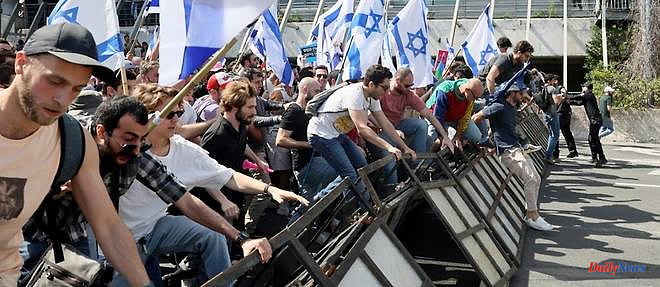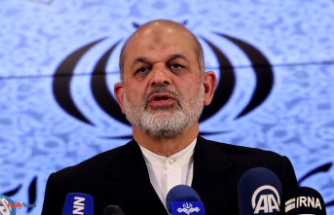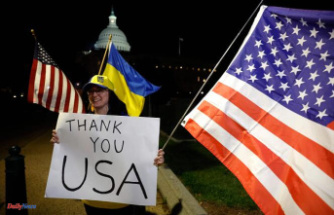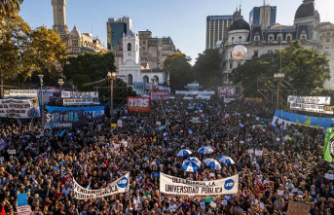Clashes between police and protesters in Tel Aviv on Wednesday opposed to the judicial reform carried by the government and which they consider anti-democratic, while Parliament adopted in preliminary reading two new controversial bills.
During a demonstration in Tel Aviv on Wednesday against the reform, during which several streets and traffic lanes were blocked, the police used water cannons and stun grenades, AFP journalists found.
Mounted police also tried to disperse the crowd. In a statement, police said they arrested 39 people for disturbing public order.
Eleven injured demonstrators were treated at Ichilov Hospital in Tel Aviv, the hospital's spokesman told AFP.
"I am here for democracy, for human rights and for justice," Johann Kanal, a 39-year-old protester, told AFP.
“We are blocking all intersections, we are stopping traffic all over the country in the hope that the current government understands that we are very serious and that we will do everything in our power to change the path it is on,” says Dina Niron, a 51-year-old lawyer from Tel Aviv.
“The right to demonstrate is not the right to block the country,” Prime Minister Benjamin Netanyahu reacted Wednesday evening during a press conference in Jerusalem.
According to him, the demonstrators crossed "a red line". "A sovereign country cannot tolerate anarchy," he added.
He had supported the police earlier on Wednesday.
This new demonstration comes as the Israeli Knesset (Parliament) meeting the same day in plenary session adopted in preliminary reading a new law within the framework of the reform of justice, announced at the beginning of January by the government that Benjamin Netanyahu formed in December with far-right parties and ultra-Orthodox Jewish formations.
The deputies adopted by 62 votes against 20 out of the 120 in Parliament, a bill which aims to restrict the possibilities of impeachment of a Prime Minister.
This will only be possible if at least 90 deputies are in favor and only in the event of physical or mental incapacity.
According to the procedure, the proposal must go through a committee of the Parliament, which will decide to submit it to a vote at first reading.
According to critics of the reform, it aims to reduce the influence of the judiciary in favor of political power, threatening the balance of power and the democratic character of the State of Israel.
But Mr. Netanyahu and his Minister of Justice Yariv Levin consider it necessary to restore a balance of power between elected officials and the Supreme Court, which the Prime Minister and his allies consider politicized.
The deputies also adopted in preliminary reading a text of law aiming to inflict "the death penalty on terrorists", by 55 deputies against 9.
Capital punishment for terrorists has long been called for by some far-right MPs, but it has never found enough support to become law.
The text would however have little chance of being adopted in Israel - where the death penalty has only been applied once by civil justice, against the Nazi war criminal Adolf Eichmann, in 1962 - the formations ultra-Orthodox being inclined, for religious reasons, to vote against.
03/01/2023 21:59:49 - Jerusalem (AFP) - © 2023 AFP












